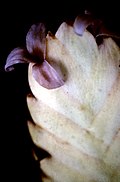Wallisia
| Wallisia | |
|---|---|

| |
| Wallisia lindeniana (syn Tillandsia lindenii) | |
| Scientific classification | |
| Kingdom: | Plantae |
| Clade: | Tracheophytes |
| Clade: | Angiosperms |
| Clade: | Monocots |
| Clade: | Commelinids |
| Order: | Poales |
| Family: | Bromeliaceae |
| Subfamily: | Tillandsioideae |
| Genus: | Wallisia (Regel) É.Morren |
| Type species | |
| Wallisia lindeniana | |
Wallisia is a genus of flowering plants belonging to the family Bromeliaceae.[1] It is also in the Tillandsioideae subfamily.[2]
Its native range is central and southern Tropical America (within Belize, northern Brazil, Colombia, Costa Rica, Ecuador, French Guiana, Guatemala, Guyana, Honduras, Nicaragua, Panamá, Peru, Suriname and Venezuela) and Trinidad and Tobago (in the Caribbean).[1]
Known species
As accepted by Plants of the World Online As of January 2023::[1]
| Image | Scientific name | Distribution |
|---|---|---|
 |
Wallisia anceps (G.Lodd.) Barfuss & W.Till | Central America, Colombia, Ecuador, Trinidad and Tobago, the Guianas, Venezuela and northern Brazil |
 |
Wallisia cyanea Barfuss & W.Till | Ecuador |
| Wallisia × duvalii (L.Duval) Barfuss & W.Till (W. cyanea × W. lindeniana) |
Ecuador. | |
| Wallisia lindeniana (Regel) É.Morren | Ecuador | |
| Wallisia pretiosa (Mez) Barfuss & W.Till | Ecuador |
The genus name of Wallisia is in honour of Gustav Wallis (1830–1878), a German plant collector.[3] It was first described and published in Ann. Hort. Belge Étrangère Vol.20 on page 97 in 1870.[1]
References
- ^ a b c d "Wallisia (Regel) É.Morren | Plants of the World Online | Kew Science". Plants of the World Online. Retrieved 13 March 2021.
- ^ Barfuss, M.H.J., Till, W., Leme, E.M.C., Pinzón, J.P., Manzanares, J.M., Halbritter, H., Samuel, R. & Brown, G.K. (2016). Taxonomic revision of Bromeliaceae subfam. Tillandsioideae based on multi-locus DNA sequence phylogeny and morphology Phytotaxa 279: 1-97
- ^ Burkhardt, Lotte (2018). Verzeichnis eponymischer Pflanzennamen – Erweiterte Edition [Index of Eponymic Plant Names – Extended Edition] (pdf) (in German). Berlin: Botanic Garden and Botanical Museum, Freie Universität Berlin. doi:10.3372/epolist2018. ISBN 978-3-946292-26-5. S2CID 187926901. Retrieved 1 January 2021.
